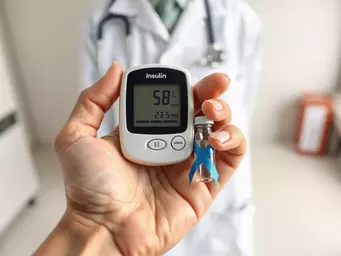Sleep's Impact on Diabetes Management

Did you know that both a lack of sleep and too much sleep can increase your risk for type 2 diabetes? Understanding this intricate connection can empower you to take control of your health.
What You Will Learn
- There is a U-shaped relationship between sleep duration and the risk of type 2 diabetes, where both insufficient and excessive sleep can lead to health complications.
- Poor sleep quality, including frequent interruptions and irregular sleep patterns, adversely affects blood glucose management.
- Disruptions in circadian rhythm can impair insulin sensitivity, making it essential to maintain a consistent sleep schedule.
- Sleep disorders, such as obstructive sleep apnea, pose significant challenges to effective diabetes management.
Sleep's Impact on Diabetes Management
Understanding the U-shaped relationship between sleep duration and diabetes risk, along with the influence of sleep quality and circadian rhythm on glycemic control.
U-Shaped Relationship: Sleep Duration vs. Diabetes Risk
Both insufficient (<6-7 hours) and excessive (>9 hours) sleep correlate with a heightened risk of developing type 2 diabetes.
Balanced sleep is crucial (6-9 hours)
Impact of Sleep Quality on Glycemic Control
- Interruptions: Prevent deep sleep.
- Late Bedtimes: Disrupt circadian rhythm.
- Poor Quality: Worsens glycemic control.
Inadequate restorative sleep leads to elevated blood sugar.
Circadian Rhythm & Insulin Sensitivity
Disruptions in the body's natural circadian rhythm (e.g., irregular sleep, shift work) can significantly impair insulin sensitivity.
Consistent sleep schedule supports metabolic health.
Key Risk Factors for Type 2 Diabetes
- Obesity: Insulin resistance.
- Inactivity: Increased risk.
- Unhealthy Diet: Weight gain.
- Sleep Deprivation: Worsens sensitivity.
Lifestyle choices significantly impact risk.
Exploring the Intricate Connection Between Sleep and Diabetes Management
When it comes to managing diabetes, understanding the various factors that contribute to the condition is vital. One of those factors is sleep. As someone who has dedicated years to helping individuals navigate their diabetes journey, I can attest to the profound impact that both the quantity and quality of sleep have on overall health, particularly regarding type 2 diabetes. In this section, we'll delve into the basic concepts of diabetes, focusing on type 2 diabetes, its risk factors, and how sleep ties into the larger picture.
Understanding Diabetes: Types and Risk Factors
Diabetes is a complex condition, primarily categorized into two types: type 1 and type 2. Type 1 diabetes is typically diagnosed in childhood and results from the body's inability to produce insulin. In contrast, type 2 diabetes is more prevalent and often develops in adulthood, often linked to lifestyle choices and genetic predispositions. Key risk factors for type 2 diabetes include:
- Obesity: Excess body weight is a significant contributor to insulin resistance.
- Physical inactivity: Sedentary lifestyles increase the risk of developing type 2 diabetes.
- Unhealthy diet: Diets high in processed foods and sugars can lead to weight gain and insulin resistance.
- Genetics: A family history of diabetes can elevate risk levels.
- Age: The risk increases as we age, particularly after 45.
- Sleep deprivation: Poor sleep patterns can worsen insulin sensitivity.
By recognizing these risk factors, we're better equipped to make informed choices to manage our health effectively. It's essential to consider how our daily habits, including sleep, can significantly impact these risk factors.

The Impact of Sleep Patterns on Diabetes Risk
As we explore the connection between sleep and diabetes, recent studies reveal compelling insights into how our sleep habits can influence our diabetes risk. The relationship between sleep duration and diabetes is particularly interesting due to its U-shaped curve—both insufficient and excessive sleep can lead to increased risk factors for type 2 diabetes.
The U-Shaped Relationship Between Sleep Duration and Diabetes
Research indicates that both short sleep durations (less than 6-7 hours) and excessively long sleep (more than 9 hours) correlate with a heightened risk of developing type 2 diabetes. This U-shaped relationship suggests that finding a balance is crucial. For instance, studies show that individuals who routinely sleep less than six hours per night are more likely to experience insulin resistance. At the same time, consistently sleeping too much can also lead to metabolic disruptions.
Understanding this dynamic can empower us to prioritize sleep as part of our overall diabetes management strategy. After all, sleep is more than just a time to rest—it's an essential part of our health regimen.
Sleep Quality as a Determinant of Glycemic Control
While the quantity of sleep is important, the quality of that sleep affects our blood glucose management significantly. Poor sleep quality—marked by interruptions, late bedtimes, or restlessness—has been linked to worsened glycemic control. Inadequate restorative sleep can lead to elevated blood sugar levels, making diabetes management even more challenging.
- Sleep interruptions: Frequent awakenings can prevent the body from entering deep sleep, which is crucial for recovery.
- Late bedtimes: Going to bed late can disrupt the body's natural circadian rhythm, affecting insulin sensitivity.
- Sleep medications: While they may help you fall asleep, some can interfere with sleep quality, leading to less restorative rest.
Recognizing the impact of sleep quality on glycemic control is a vital step toward better diabetes management. It’s not just about how much we sleep, but how well we rest that counts!

Understanding Circadian Rhythm and Its Effects on Diabetes
Our bodies run on an internal clock known as the circadian rhythm. This rhythm regulates various biological processes, including sleep-wake cycles and hormone release. Disruptions in our circadian rhythm—often caused by irregular sleep patterns or shift work—can significantly influence insulin sensitivity and overall diabetes risk. Recent studies, such as one exploring circadian misalignment and diabetes risk, have highlighted that individuals with circadian misalignment may experience difficulty in managing their blood sugar levels.
By understanding how our body’s clock works, we can take steps to align our sleep patterns with natural cycles, ultimately supporting better diabetes management. This alignment can help with insulin response and improve overall metabolic health.
Pro Tip
To enhance your sleep quality, consider adopting a "digital sunset"—set a time each evening to disconnect from screens. Research suggests that limiting exposure to blue light before bedtime can improve sleep quality, which is crucial for effective diabetes management.
Frequently Asked Questions About Sleep and Diabetes
Q: How does sleep duration affect my risk of type 2 diabetes?
A: Both insufficient sleep (less than 6-7 hours) and excessive sleep (more than 9 hours) are associated with an increased risk of type 2 diabetes. This is known as a U-shaped relationship, highlighting the importance of balanced sleep duration.
Q: Why is sleep quality important for managing blood sugar levels?
A: Poor sleep quality, characterized by frequent interruptions or irregular sleep patterns, can lead to elevated blood sugar levels and worsen glycemic control. Restorative sleep is crucial for the body's ability to regulate glucose effectively.
Q: What is the circadian rhythm, and how does it relate to diabetes?
A: The circadian rhythm is your body's natural internal clock, regulating sleep-wake cycles and hormone release. Disruptions to this rhythm, often from inconsistent sleep schedules or shift work, can impair insulin sensitivity and increase diabetes risk.
Q: Can sleep deprivation directly lead to type 2 diabetes?
A: While sleep deprivation is a significant risk factor, it doesn't directly cause type 2 diabetes. Instead, it contributes to factors like insulin resistance and impaired glucose metabolism, which can accelerate the development of the condition, especially in combination with other risk factors.
Q: Are there studies supporting the link between sleep and diabetes?
A: Yes, numerous studies confirm this link. For example, research published in JAMA Network Open has explored the association between sleep patterns and the risk of developing type 2 diabetes, reinforcing the importance of healthy sleep habits.
Key Takeaways on Sleep’s Role in Diabetes Prevention
In summary, the connection between sleep and diabetes management is multifaceted and critical. I’ve highlighted several key points that emphasize how both sleep quality and duration significantly influence diabetes risk and management. Here are the vital takeaways:
- A U-shaped relationship exists between sleep duration and the risk of type 2 diabetes, where both insufficient and excessive sleep can lead to health complications.
- Poor sleep quality, including frequent interruptions and irregular sleep patterns, adversely affects blood glucose management.
- Disruptions in circadian rhythm can impair insulin sensitivity, making it essential to maintain a consistent sleep schedule.
- Sleep disorders, such as obstructive sleep apnea, pose significant challenges to effective diabetes management.
By understanding these factors, we can take proactive steps to enhance our sleep and, consequently, our health. I encourage you to reflect on your own sleep patterns and consider how they might be impacting your diabetes management journey!
Encouraging Healthy Sleep Habits for a Healthier Future
As we conclude, it’s essential to recognize the power of quality sleep in preventing and managing diabetes. I urge you to implement the sleep strategies discussed throughout this article. Here are some practical steps you can take:
- Establish a regular sleep routine by going to bed and waking up at the same time every day.
- Create a relaxing bedtime environment, free from distractions like screens or excessive noise.
- Explore relaxation techniques, such as deep breathing or meditation, to help improve your sleep quality.
By integrating these habits into your daily life, you can significantly enhance your overall well-being. Remember, consulting with your healthcare provider for personalized advice can further empower you on your path to better health. Let’s take charge of our sleep for a brighter, healthier future together!
Recap of Key Points
Here is a quick recap of the important points discussed in the article:
- A U-shaped relationship exists between sleep duration and the risk of type 2 diabetes, where both insufficient and excessive sleep can lead to health complications.
- Poor sleep quality, including frequent interruptions and irregular sleep patterns, adversely affects blood glucose management.
- Disruptions in circadian rhythm can impair insulin sensitivity, making it essential to maintain a consistent sleep schedule.
- Sleep disorders, such as obstructive sleep apnea, pose significant challenges to effective diabetes management.









